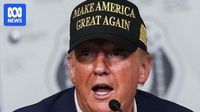On Sunday, April 13, 2025, Commerce Secretary Howard Lutnick announced that the recent exemption of a range of electronic devices from tariffs is merely a temporary measure. This announcement came in the wake of a U.S. Customs and Border Protection bulletin issued on Friday, which clarified that products such as smartphones, computers, solar cells, flat-panel TV displays, and semiconductor-based storage devices would not be subject to tariffs previously implemented on April 2. However, Lutnick emphasized that these items will soon fall under "semiconductor tariffs" expected to be introduced in the coming month or two.
During an interview on ABC's "This Week," Lutnick explained the administration's strategy to promote domestic manufacturing of essential technologies. "All those products are going to come under semiconductors, and they're going to have a special focus type of tariff to make sure that those products get re-shored," he stated. He underscored the importance of producing semiconductors and chips within the United States, asserting that reliance on Southeast Asia for critical components poses a national security risk.
"We can't be beholden and rely upon foreign countries for fundamental things that we need," Lutnick continued, indicating that the administration is committed to reshoring manufacturing capabilities. He noted that the tariffs are designed not only to protect American jobs but also to encourage the semiconductor and pharmaceutical industries to relocate their operations back to the U.S.
In a related development, Lutnick referenced Panasonic's recent investment in Kansas, where the Japanese battery manufacturer has established a new factory. This move exemplifies the administration's goal of revitalizing American manufacturing and reducing dependence on foreign production.
Meanwhile, the political landscape is shifting as President Donald Trump continues to navigate the complexities of international trade. In a Fox News interview earlier this month, political figure J.D. Vance remarked, "We borrow money from Chinese peasants to buy the things that those Chinese peasants manufacture," highlighting the ongoing debate over the United States' economic relationship with China.
As tariffs loom on the horizon, Lutnick expressed confidence that the trade tensions with China would eventually resolve positively. He stated, "I am completely confident, as is Trump, that this will be worked out in a positive, thoughtful and effective way for the United States of America." This sentiment reflects a broader hope that diplomatic negotiations will lead to a resolution of the current trade disputes.
However, the implications of Trump's executive orders extend beyond trade. In a separate but related issue, the president recently issued an executive order aimed at regulating water pressure in showerheads, a move that many critics have dismissed as trivial. Yet, some analysts suggest that it may represent a more significant power grab by the administration, undermining the Administrative Procedure Act (APA) of 1946.
According to legal experts, the order directs the Secretary of Energy to reverse a Biden-era regulation regarding showerheads without undergoing the necessary notice and comment process mandated by the APA. This has raised concerns about the potential erosion of regulatory safeguards that have been in place to ensure public involvement in the regulatory process.
As the political climate becomes increasingly polarized, Trump's administration faces scrutiny over its approach to governance. Critics argue that the executive order on showerheads is indicative of a broader trend toward authoritarianism, where the president seeks to bypass established legal frameworks in favor of unilateral decision-making.
The recent confirmation of Retired Air Force Lieutenant General John Dan "Razin" Caine as chairman of the Joint Chiefs of Staff has also sparked controversy. Many observers noted that Caine lacks the requisite experience, having not served in any of the seven previous positions mandated by law for this role. The president's ability to override these legal requirements has raised alarms about the politicization of the military and the potential consequences for national security.
Trump's use of emergency powers to impose tariffs has also come under fire. By declaring an emergency under the International Emergency Economic Powers Act of 1977, the president has been able to bypass Congress and implement policies that critics argue could destabilize the global trading system. The tariffs, which currently stand at 145 percent for American products compared to 125 percent for Chinese goods, have sparked fears of a trade war that could have dire consequences for both economies.
Last week, the U.S. dollar experienced a decline while long-term interest rates rose, signaling a potential loss of confidence among investors. The U.S. 10-year bond rate increased from 4 to 4.5 percent, reflecting market concerns about the administration's economic policies and their impact on the broader economy.
As the trade war escalates, analysts warn that the consequences could extend beyond the United States. Countries like Australia, which rely heavily on trade with both the U.S. and China, may face significant economic challenges in the wake of escalating tariffs and market instability.
In summary, the recent developments surrounding tariffs, executive orders, and military appointments illustrate the complexities of the current political landscape. As the Trump administration navigates these challenges, the potential for significant changes in U.S. trade policy and governance remains a topic of intense debate.





